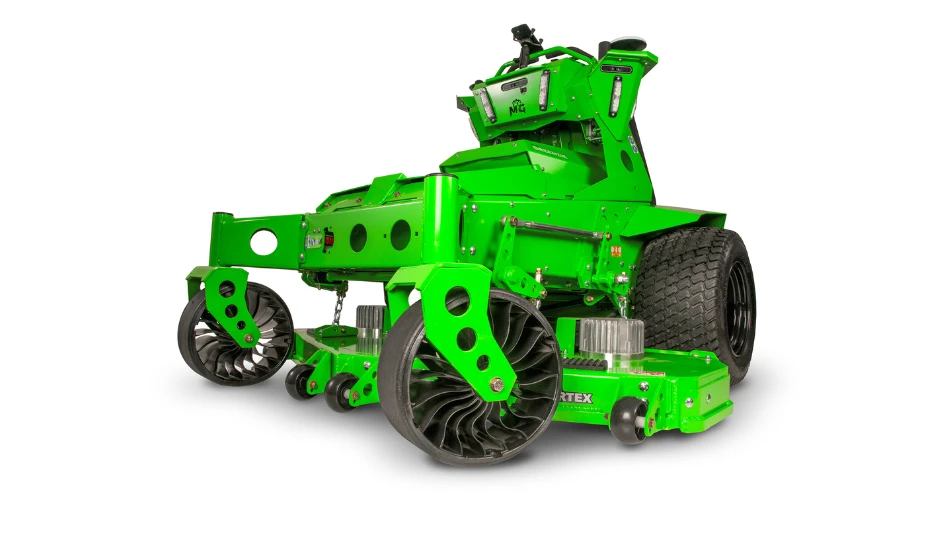As the demand for the construction of single-family homes, corporate campuses and golf courses increases, so does the need for quality lawn care and landscaping. And one of the biggest challenges facing these industries is the need for effective weed control.
New, unique herbicide formulations have been introduced that, when combined with fertilizer products, offer contractors the ability to fertilize turf and control broadleaf weeds regardless of turf conditions, thereby saving them application time.
SPRAYABLE VS. GRANULAR. The debate between granular and sprayable herbicides has a long history. For more than 20 years, professionals have had to use a liquid herbicide to effectively control broadleaf weeds. Companies have certainly tried granular applications, but all too often found that they were unable to obtain acceptable weed control. Many commonly used weed control components work well as a sprayable solution but not very well as a granular application.
Bob Andrews, president of Carmel, Indiana-based Greenskeeper, Inc., explained that he has tried a variety of granular herbicides over the years.
"With granular products, I always seem to encounter two primary problems: the granular products require the turf to be wet, and they usually don’t meet my control requirements," Andrews elaborated. "If the turf wasn’t wet enough, the granules fell off and were useless, and if the turf was dry, forget about it. But, for some applications, we had to use a granular herbicide since using a sprayable product was either difficult or impossible."
Most of the granular herbicide products on the market could only be absorbed through the weed’s foliage, which is why the labels normally recommended watering the turf prior to application. Granules that fell off of the foliage provided less control.
So many companies have tended to use sprayable products even in applications where a granular herbicide may have been better suited.
NEW TECHNOLOGY. Herbicide/fertilizer compounds have been tested at a number of universities, including Mississippi State University, Iowa State University, Clemson University and The Ohio State University. The compounds tested were both shoot- and root-active, and the results showed increased efficacy on weeds on both wet and dry turf. Tests also showed that the performance with granular herbicide-based fertilizers was as effective, if not better in some instances, as that with sprayable compounds.
Andrews began using one of the products and has been happy with the results. One of the jobs that his company has used them on is a 4-mile, city-owned boulevard that is inaccessible by spray truck.
"The road is long and narrow, and the granular product has given us as much control as a sprayable one would have," Andrews explained.
Andrews said that his decision to use a granular over a sprayable application is based on customer request and application needs.
"Our customers are interested in one thing: results," Andrews explained. "They aren’t concerned with what product we use to get those results. I’ve encountered a number of instances where a granular was the most efficient and cost-effective option."
Joe Zelinko, sports turf manager of Oregon, Ohio-based Athletic Field Services, called new granular herbicide/fertilizer combinations a technological breakthrough.
"A lot of hype has surrounded other granular products that guaranteed results, and I was disappointed with their weed control everytime. But these newest formulations have given me some quality results," Zelinko added.
FORMULATOR’S THOUGHTS. A number of formulators have recognized contractors’s need for these products and are adding the uniquely formulated granular weed-and-feed products to their fertilizer lines.
Doug Masters, national sales manager for the professional products division, The Anderson’s, Maumee, Ohio, explained the benefits that carrying this type of product brings to his customers.
"Many customers were looking for an alternative to a sprayable weed control because of application requirements. An effective granular weed control option mixed with a fertilizer was the answer," Masters stated.
"Carrying this type of product offers our customers alternatives – letting them meet their customers’ demands," Masters added.
Howard Johnson’s Enterprises, Milwaukee, Wis., is another formulator distributing granular weed control fertilizers, which are customized depending on the geographic location where the product is being sold.
"For years, professionals have tried different granular-based products that had to be used on wet turf with less-than-stellar results. For lawn care companies and landscape firms, the performance of their products is what keeps them in business. They can’t afford a lot of callbacks or cancellations," added Joe Ernst, commercial sales manager for Howard Johnson’s Enterprises.
Masters also feels that lawn and landscape professionals are having a harder time believing that a granular application will be as effective as a liquid application.
"With these segments of the market, getting contractors to use granular products is a matter of battling stereotypes and educating them on the benefits these products offer them and their customers," Masters commented. "Many contractors tried other granular products that only work on wet turf, and often those products didn’t meet their weed control requirements."
"Lawn and landscape professionals are used to a contact weed control product and are often suspicious of a granular-based product, which, in the past, hasn’t given acceptable control," Ernst agreed. "But the latest granular weed-and-feed fertilizer that we, and other distributors, are carrying offers outstanding weed control on wet or dry turf."
Now turf care suppliers are working to educate contractors about the benefits of the granular weed control-based fertilizers.
Greg Richards, senior product manager for LESCO, Rocky River, Ohio, explained some of the benefits of these products.
"The advanced formulation technology of these fertilizer/herbicide combinations offers contractors results almost equal to sprayable applications," Richards explained. "Many contractors don’t realize that the granular-based products don’t harm trees or shrubs, but they do offer excellent results for broadleaf weed control with active ingredients that are absorbed by a weed’s foliage and roots."
"Even though the initial cost of liquid products might be higher, in the long run contractors can save time and money by being able to effectively control weeds and fertilize the turf concurrently regardless of its condition," Ernst summarized.
"In the last two years, a lot of testing has taken place on a variety of herbicide/fertilizer compound combinations," added Curtis Clark, marketing manager for Riverdale Chemical Co., Glenwood, Ill. "As a result, a number of granular-based combinations that deliver improved broadleaf weed control have been identified."
OTHER ADVANTAGES. Often, lawn care companies lose days of potential application due to the threat that a sprayable product might drift in windy conditions and end up causing off-site damage.
"Using a sprayable product is challenging in rainy or windy conditions," Zelinko explained. "A lot of our customers are schools and municipalities, and they are concerned with the damage a sprayable product could cause on a windy day. These customers cannot afford delays in making an application, so a granular product is the answer."
Andrews also added that the degree of weed control is not diminished even if rain falls soon after application with a herbicide/fertilizer combination product.
John Page, department manager for the pesticide division at DeVries Landscape Management, Jenison, Mich., added that the size of the application area often determines whether what product can be used.
"A lot of companies can’t spray 100 acres in a day – often due to the lack of equipment," Page explained. "But with a granular herbicide-based fertilizer, an applicator can be hooked up to a tractor, which can usually perform the same size job in one day."
The list of weeds that the granular weed-and-feed products eliminate or suppress is extensive.
"Dandelions, wild violet or clovers – the combination products we have used has worked on all of them," related Zelinko. "I have never seen this type of control on such hard-to-control broadleaf weeds with a granular product. I perform less reapplication and the product has a longer residual. Both of these factors save me time and money," Zelinko stated.
The new products also have a lower amount of active ingredient while still giving professionals a higher level of control. Depending on the application and the customer, this can be a distinct advantage.
"Some contractors have made it a policy to reduce the amount of active ingredient in the products that they apply. This product helps them do that," Richards stated.
Kate Eidam is with NDW Communications in Horsham, Pa.

Explore the November 1999 Issue
Check out more from this issue and find your next story to read.
Latest from Lawn & Landscape
- Connect, Control & Conserve with Horizon Technical Services
- Use Horizon's Parts Hotline
- How I built a Top 100 company
- Horizon’s Exclusive TurfGro Fertilizer
- Grow your business with mosquito control
- LandCare adds 2 branches in SoCal, promotes Aleman to branch manager
- Spray them away
- PERC helps debut propane direct-injection fuel system at ACT Expo 2025





